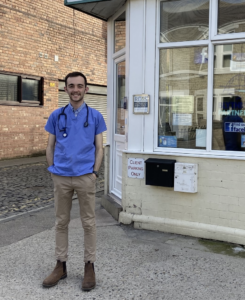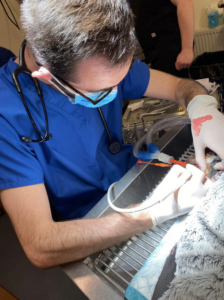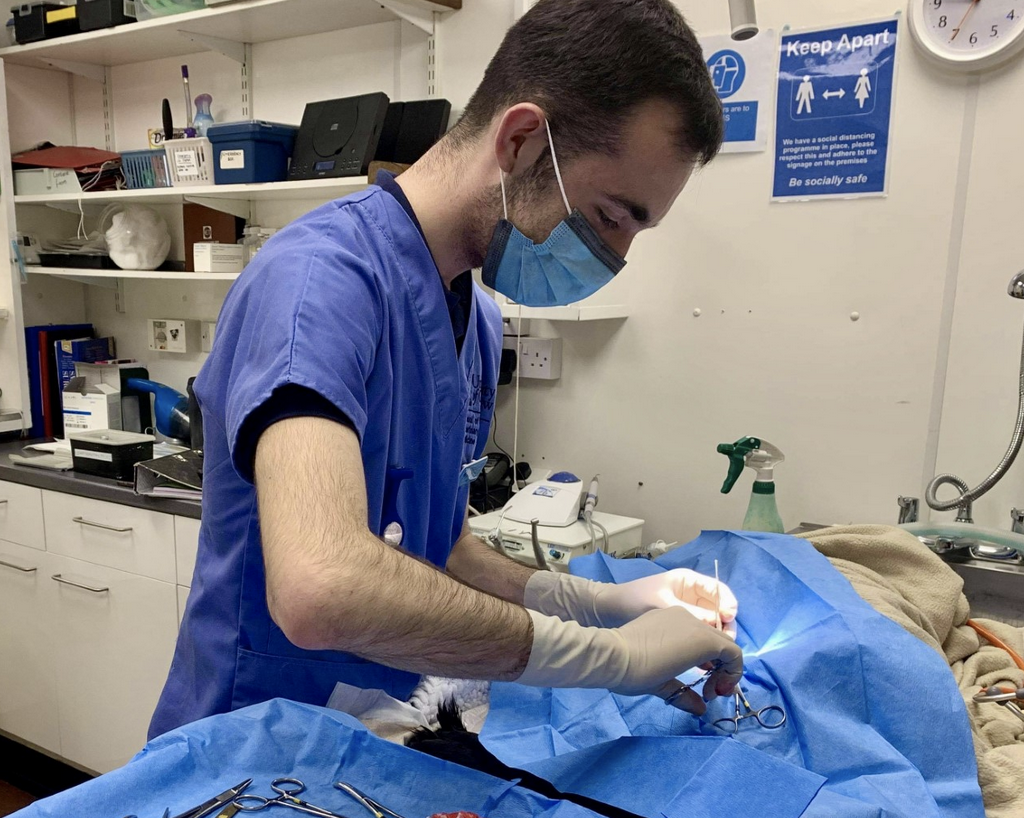by Olly King, Founder
Meraki HQ, Totnes, UK
Created 928 days ago
EMS Stories: GUVMA President Shares His C-EMS Experiences
On the home straight to securing his MRCVS, I chatted with Luke McBlain, Class of 2023 and Glasgow Vet School’s GUVMA President, about all things C-EMS. Luke’s opportunities to undertake C-EMS had been negatively impacted by COVID. But after a summer packed of placements, Luke, now in his final year, has nearly completed his minimum RCVS 13 weeks requirement. Passionate about helping other vet students enjoy a better learning experience, Luke shares some honest and great advice to getting the most out of your C-EMS placements.
“You learn from both the best and bad bits of EMS. If you have a bad placement and don’t get much out of it, don’t take it to heart.”
How is completing your EMS going so far?
Good thanks. I’ve done a few one or two-week placements and spent four-weeks at another, predominantly small animal so far. Mainly because it was easiest to get during COVID. But some of my placements were at mixed practices so I have been able to also see routine work on the farm side of things to give me a good mix to suit my interests.
I’ve spent most time at a practice I got to know as a school student, shout out to MBM Veterinary Group in Mauchline, Ayrshire. I am also seeing equine practice with their Kilmarnock branch in October. Knowing them so well now, we have gotten to trust one another. They have been amazing in supporting my learning.
I‘ve also enjoyed time at a practice owned by a friend in my years’ mum and dad, in Newcastle, who even welcomed me into their family home. I thought it was going to be difficult going to work with them, coming home and staying with them all the time, but it was lovely, and switching off was easy.
This also happened on another placement. I kept in touch with a vet I saw practice with in my home town. After they moved away I saw practice with them and they let me stay in their spare room. It adds a different element to EMS, making it a more casual environment. I get a lot out of the drive home and all the informal dinner table chat listening to life as a vet. It has been a lovely way to get to know people. I would recommend this approach to others if the opportunity arises.
 Do you think your experiences of securing free accommodation are more of an exception rather than the norm?
Do you think your experiences of securing free accommodation are more of an exception rather than the norm?
My accommodation was through friends. But the Facebook social media community group VetBeds has started to connect vet ‘strangers’ offering placements with accommodation to students, some paid, some free. People will occasionally also offer their entire home, posting something like “I’m going to be away on holiday in June, if someone wants to move in and pet sit my cat while seeing practice let me know”. It’s brilliant for bringing people together and really helps students with the cost of seeing practice, but don’t get me started on that!
Would you say MBM Veterinary Group is like a ‘foster practice’ to you?
If you were to give it a name, then yes. It is where I have gotten the majority of my hands on, like placing catheters, taking bloods, taking nurse consults and doing patient discharges amongst other procedures and stuff.
With the shortage of vets I have felt a really valuable part of the team and benefitted from more hands-on responsibility. I get involved all around the practice. Some days I triage calls with reception and phone clients to help schedule appointments according to level of importance for either that day or later in the week.
I have also enjoy covering reception shifts at the weeknd. It is great for gaining an insight into seeing how the business as a whole runs and the pressures of different roles. I think people underestimate what you learn from reception work, perhaps shying away from it or thinking they are better than that. But it is still a skill to master, and can support the practice by stopping the phones ringing out the back, this doesn’t help anyone.
It sounds like you are getting a great holistic experience at your home practice. How does this contrast with your experiences in other practices where you may have not spent so long?
My experiences in other practices have definitely been colder and I have felt less part of the team. I understand not all vets in the workplace want to engage with students and their learning, but I have certainly had polar experiences on days when the vet that was showing me the most was not in.
Also, seeing practice in a single gendered practice, I felt I struggled to fit in. It felt really cliquey and difficult to get a connection with anyone in the team, and I am a really chatty person. It was weird to experience that. I’ve never felt that before and did not get any hands-on experience in that workplace.
It was a shame to not get the chance to show what I had to offer. I was glad I was only there for one week. Usually by the Wednesday you know your way about a practice, and by Friday really getting stuck in. But come Friday I was glad for it to be over. It felt like a wasted week.
The inconsistency around the quality of EMS does seem to be still an ongoing frustration. I had similar experiences as a student 16 years ago and was highlighted in the AVS 2018 EMS Survey also. What constructive learnings have you taken away from these less positive placements?
How to manage teams and people differently. How not to treat students on placement. The fact that short one-week placements in a new practice is going to be hit and miss in terms of gaining decent experience. I understand it takes time for the team to get to know you, so in hindsight I should have just returned to my home practice.
How are your clinical EMS experiences sculpting the kind of vet that you want to be, or your attitude of the profession?
I am enjoying getting a taste of different aspects of the profession. I want to go into clinical practice and don’t mind farm, but don’t really see myself doing just farm work. With the shortage of vets I have heard of practices being more accommodating in giving new graduates the flexibility to choose the type of work they want to do, where vets previously may have been asked to choose one particular animal type. I know a few people that are doing equine and small animal, which would suit me.
Location is also important for me. I want to be less city based. I find the small animal caseload there can get samey dealing with the same breeds. I like the variety and, other than one particular corporate group where I had a bad experience, am open-minded whether I work for a corporate or a privately owned independent practice.
“Exposure to a variety of EMS experiences I find really useful. It makes me clearer in my mind both my own needs and what I want out of my first job.”
What specifically about this corporately owned practice has left this impression on you?
The lack of willingness to teach and mentor. This was re-enforced overhearing the senior vets talking about how they were going to be training up the new graduate. It sounded very small steps, regimented and untailored to the confidence and competence of the individual.
I understand there is a balance in being supportive, but this needs to be discussed with the individual. Being clear on the needs of their new graduate, their interests and what they want out of their role must be considered. I think it should be a sit-down conversation at the start of the working relationship and a developmental plan put in place.
Exposure to a variety of EMS experiences I find really useful. It makes me clearer in my mind both my own needs and what I want out of my first job. I will then actively try to avoid these type of fixed-mindset practice cultures on subsequent placements.
Have you had any other negative experiences that you are able to share?
Sadly yes. It has mostly been team members being disrespectful and unprofessional openly towards one another. It leaves everyone witnessing the incident feeling awkward. It is eye opening stuff. You get to get a real taste for what workplace politics is like. I think it probably happens a lot in workplaces. Seeing that as a student, I understand workplaces aren’t going to be perfect and we work in pressurised environments, but there are ways of dealing with things. For me it comes down to the quality of leadership and management and people being too stretched to cope.
 To what extent does your university EMS system support students in flagging to others a placement where someone reports a less positive clinical EMS experience?
To what extent does your university EMS system support students in flagging to others a placement where someone reports a less positive clinical EMS experience?
All EMS placements need to be pre-approved by the EMS office. If you book EMS at a placement that has had a complaint in the past, the EMS office will contact you to discuss precautionary measures or in extreme cases not let you go. It is usually nothing more than an advisory warning while being sure to let the EMS office know if we experience any issue at all. The majority of these come from pre-clinical experiences from what I’ve heard.
Have you ever openly shared constructive feedback directly to a practice?
No, I have not. It is a small profession and people move around, so I worry about putting myself in a bad light. Particularly, if I do not feel safe to speak up and fear that the individual is not open enough to take my feedback the right way.
The EMS forms can make it difficult to give honest feedback too. The student and placement supervisor feedback are on the same piece of paper. Generally, students are supposed to review the placement in our part first before the assessor completes the 2nd part of the form. This is fine if you are sharing positive feedback with the practice.
But if you would like to share constructive feedback with EMS office, completing our section first is really awkward with the practice able to see what you have written about them. It risks influencing the feedback we are given. While I value feedback for my own development, if there is negative feedback that I want to share I will try and get my placement supervisor to complete their part first before completing my bit later.
I’m enjoying listening to your high level of self-awareness. Tell me about your approach to ensure you get the most out of your placements?
I will always offer and make tea and coffee for the team, it is my ‘way in’. I’ve been in some practices where they have asked me to make the cups of tea, but that’s more of an insult and a mismatch in expectations. It is completely different if I choose to make tea of coffee for that vet or nurse, to help save them time. People then think more of you and are far more appreciative, often returning the favour by showing you something.
While that’s worked for me in few places to build rapport, I’m not advocating for every student to go and become a tea and coffee waiter while on EMS. But I think if you generally have a good relationship and you add in this little change to help make their day easier, then opportunities and positive things happen.
Your understanding of the importance in building relationships is fantastic. In what other ways do you try to build a good rapport?
I try to be actively involved, but not come across as too needy. I think you’ve got to really judge the situation. Asking questions and being inquisitive is good. But I find that people can ask too many questions to teams who do not have time to answer, and that risks having a negative effect. I consciously try to find a balance over the first couple of days. Figure out what your role is, what you can get out of it, and communicate with everyone at all times.
For example, it’s quicker at the beginning of the week to sit down with may be whoever’s overseeing you, sometimes it is a vet or it may be a nurse. But if it is a good practice, there will be someone supervising you and they will ask you what you want to get out of your week to actively help you meet your goals. The practices where I have even had an informal check-in halfway through the placement have by far been the best.
I know that desire for pre-placement or kick-off placement meetings was strongly reported in the AVS 2018 EMS Survey, is this becoming more the norm do you think?
In a few places we have sat down at the beginning of the week, gone through expectations and what I wanted to get out of my placement. I have found that it has been the older vets who would take more of an interest in my learning, being keen to get me doing the cat castrate or to teach me, more so than the younger vets. This list is then target-distributed to the one or two people who are more involved in student learning, rather than to the whole team.
I think with a lot of practices taking on new grads, shadowing people who aren’t entirely confident within themselves yet and are still trying to develop, leads to a real mix of experiences for vet students, and can risk students not getting to do much. Adding a vet student of course adds a lot of pressure to these new grads as well.
One older vet told me “when on placement, shadow the oldest and most experienced in the practice”. Putting their advice into practice has certainly worked to my advantage. At this same time, while it is good to learn from a variety of professionals: younger vets and more experienced vets, I do try to be aware of ‘clinical bad habits’ to add context to my learning and experience.
What have been your EMS experience highlights so far?
Being able to get opportunities to see lots of different things and feeling like I have been left to my own devices. It is pretty scary the vet saying “go and remove that lump.” Of course the vet is standing behind you supervising, but it’s such an achievement once you’ve done it and is a great way to get as close as you can to how you might feel as a professional. I actively seek out more responsibility, and when I actually get it, it does feels daunting, but I know it is good for my growth and development.

Your ‘can do’ positive attitude and growth-mindset Luke is fantastic. When given the right opportunities and practice culture it sounds like you thrive and are getting comfortable working at the edge of your comfort zone.
I think too many people on EMS don’t do things that they are not confident doing, worrying too much about embarrassing themselves or not being able to do something. I think a lot of people go with the impression to impress, but like, you’re a student at the end of the day. You’re not expected to know or to be able to do everything well.
I have made stupid mistakes along the way. After collecting a blood sample, I filled the wrong blood tubes. Luckily the dog was still in the practice and so we could get more blood from the dog. It was not ideal. But the vets were patient and never criticised or displayed any annoyance to compound the disappointment I felt in myself.
“…when the practice vibe is more friendly you are motivated to stay right until the very end to see more, do more and help more.”
How has your approach to clinical EMS changed from when you first started seeing practice?
My focus is always now on building connections with the people and the practice. I find I get so much more out of my time the more personable I am, balancing social and professional conversations. A lot of students at lunchtime go on their own lunch to study. I would rather sit in the lunchroom and eat my lunch chatting to the team. I enjoy being involved and feeling part of the practice community. Some practices I’ve been to have lacked this community, feeling more like a bunch of individuals. This is not the type of practice I want to work for.
You know if you are in one of those practices if you dread what the day is going to bring or you start making excuses why you need to leave early. You start doubting yourself: what am I doing to myself? Why am I training to be vet? Why am I wasting my week here? In contrast when the practice vibe is more friendly you are motivated to stay right until the very end to see more, do more and help more.
Absolutely. This is why I created Meraki. It is critical to create the practice ethos and environment where people are engaged and both self-motivated and able to give their best. Central to this is building strong relationships with peers in a practice with the right, positive culture for you. It is just as applicable to students completing EMS as it is to employees working as a professional.
I agree. One of my friends went to one of the same placements as me and I remember after it asking ‘what did you think of such and such?’. It quickly became apparent we had had polar opposite experiences, me saying ‘I couldn’t connect with them,’ and them saying ‘they were like my best friend throughout the placement.’ It is crazy the contrasting experiences people have.
This is probably my number one tip I would share with others: learn from both the best and bad bits of EMS. If you have a bad placement and don’t get much out of it, don’t take it to heart. But ensure you learn from the experience, as in “what was it about that culture that I need to be more aware of or avoid in my next placement and future workplace?”
Could not have said it better myself Luke! How have you learnt to fast track building these relationships when undertaking EMS?
I enjoy getting to know people. Building a good rapport is my area of expertise. I gently probe to kind of assess their personality in the first couple of days to see who they are. Nothing rocket science, casual questions asking how their weekend was and what they got up to. Im not analysing them, more testing the water to find out who they are as a person. Those interested in you will invariably ask the same of you to seed a personable relationship.
I also take the same approach to clinical consultations, engaging clients in small talk like ‘how was your journey?’ to show up as a human first, and vet second. I get the impression too many students on placement are too vet, vet, vet all the time. But people do not employ you as a vet, they employ you as a person and so I ensure my humour and my personality come through, and it does get noticed. Three rotations into final year so far and my feedback on my communication and professional skills has consistently been ‘excellent’, with ‘goods’ in everything else. I am more than happy with that.
This has been so refreshing Luke to hear of such a mature approach. Any tips for lower year vet students who might be starting to plan and think about clinical EMS?
I’d say while getting a diverse range of experience is good, take the time to find a practice that appreciates you, is committed to your development, then spend most time with this practice. Finding your feet in such a foster-like practice is great for your confidence, will make every other EMS experience far easier to enable you to get the most out of other placements.
I know not everyone will have that same privilege, especially my peers studying from overseas. But find a practice that is willing to support you and your learning, then spend as much time with them as you can. There is of course a balance in gaining sufficient diversity of EMS to support your learning. But all I can say is that my biasing quality over quantity has already lead to two ‘off the cuff’ job offers where I have invested the most time and effort.
Congratulations, that is fantastic! Are you following up with either of these job offers?
I would definitely consider both. But it more depends on where I want to go in the world once I graduate. I mean I would like to complete some EMS abroad, but it’s just time and cost. So I may look to do that instead once I qualify.
I get that. Having done my fair share of travelling I can relate and would encourage you to do so. I loved a research EMS placement in a neuter clinic in Palau and have enjoyed working as an equine vet in Singapore and Australia. Any final advice for students in their pre-clinical years?
Sure. Many emails to practices asking for placements go unanswered. If you really want to go somewhere, do persist. Phone calls are a nice way to introduce yourself. To avoid endless chains of emails be specific in terms of your dates from the outset. Once arranged phone or email the week before to double check and ask questions to find out specifics of what’s actually asked of you so you know what to expect.
For example, there’s nothing worse than going to EMS unprepared, without the right PPE or even your lunch! It sounds obvious, but if you’ve not brought your lunch the last thing you want to do is sit there hungry or have to ask the vet to detour somewhere for you to get something on the first day.

Got an EMS story you would like to share in our next newsletter? Get in touch with olly@merakiinitiative.com

